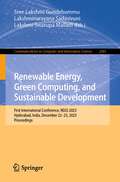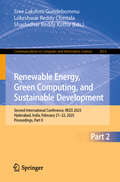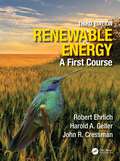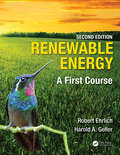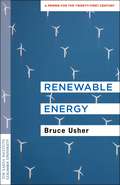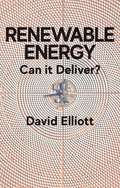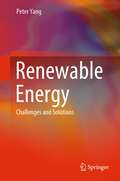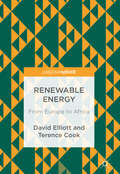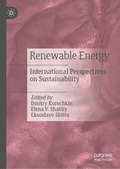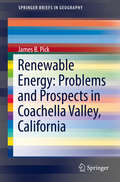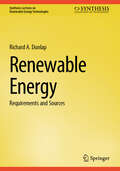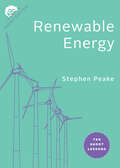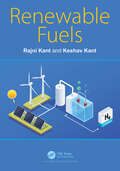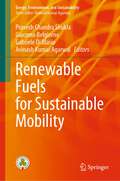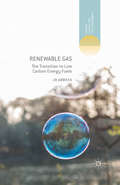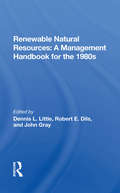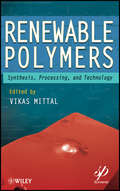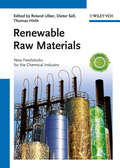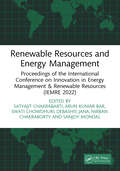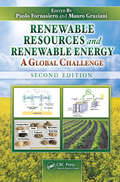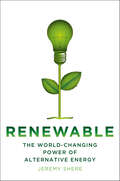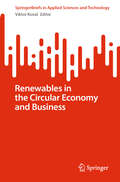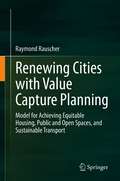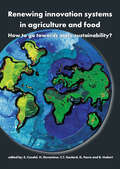- Table View
- List View
Renewable Energy, Green Computing, and Sustainable Development: First International Conference, REGS 2023, Hyderabad, India, December 22-23, 2023, Proceedings (Communications in Computer and Information Science #2081)
by Sree Lakshmi Gundebommu Lakshminarayana Sadasivuni Lakshmi Swarupa MalladiThis book constitutes the refereed post proceedings of the First International Conference on Renewable Energy, Green Computing, and Sustainable Development, REGS 2023, held in Hyderabad, India, during December 22-23, 2023. The 15 full papers included in this book were carefully reviewed and selected from 133 submissions. They were organized in topical sections as follows: Expert Systems and Artificial Intelligence; Modelling and Methods of Green Computing; Power Electronics and Renewable Energy Technologies and Communications and Signal Processing.
Renewable Energy, Green Computing, and Sustainable Development: Second International Conference, REGS 2025, Hyderabad, India, February 21–22, 2025, Proceedings, Part II (Communications in Computer and Information Science #2613)
by Sree Lakshmi Gundebommu Lokeshwar Reddy Chintala Shashidhar Reddy KothaThis two-volume set CCIS 2612-2613 constitutes the refereed proceedings of the Second International Conference on Renewable Energy, Green Computing, and Sustainable Development, REGS 2025, held in Hyderabad, India, during February 21–22, 2025.The 54 full papers were carefully reviewed and selected from 351 submissions. REGS 2025 is an interdisciplinary conference that aims at diverse fields of engineering and technology with a focus on smart and energy efficient computing, green technology and sustainable systems design and development, ranging from theoretical developments to industrial problems.
Renewable Energy: A First Course
by Robert Ehrlich Harold A. Geller John R. CressmanThis revised edition of Renewable Energy: A First Course is fully updated and continues to provide the best in-depth introduction to renewable energy science. The book focuses mainly on renewable energy, but also addresses nonrenewable energy (fossil fuels and nuclear technology). The coverage extends from the basic physics to conservation, economic, and public policy issues, with strong emphasis on explaining how things work in practice. The authors avoid technical jargon and advanced math but address fundamental analytical skills with wide application. Updated statistics, figures, policies, trends, and technological advancements will bring the reader up to speed with the current state of renewable energy.
Renewable Energy: A First Course (Second Edition)
by Robert Ehrlich Harold A. Geller<p>This revised edition is fully updated and continues to provide the best in-depth introduction to renewable energy science. It focuses mainly on renewable energy, but also addresses nonrenewable energy (fossil fuels and nuclear technology). The coverage extends from the basic physics to conservation, economic, and public policy issues, with strong emphasis on explaining how things work in practice. <p>The authors avoid technical jargon and advanced math, but address fundamental analytical skills with wide application, including: <p> <li>Two brand new chapters giving an introduction to population dynamics and statistical analysis for energy studies Additional self-study problems and answers <li>More worked examples <li>Up-to-date coverage of areas such as hydraulic fracturing, integration of renewable energy to power grid, and cost.</li> </p>
Renewable Energy: A Primer for the Twenty-First Century (Columbia University Earth Institute Sustainability Primers)
by Professor Bruce UsherFrom wood to coal to oil and gas, the sources of energy on which civilization depends have always changed as technology advances. Now renewables are overtaking fossil fuels, with wind and solar energy becoming cheaper and more competitive every year. Growth in renewable energy will further accelerate as electric vehicles become less expensive than traditional automobiles. Understanding the implications of the energy transition will prepare us for the many changes ahead.This book is a primer for readers of all levels on the coming energy transition and its global consequences. Bruce Usher provides a concise yet comprehensive explanation for the extraordinary growth in wind and solar energy; the trajectory of the transition from fossil fuels to renewables; and the implications for industries, countries, and the climate. Written in a straightforward style with easy-to-understand visual aids, the book illuminates the strengths and weaknesses of renewable energy based on business fundamentals and analysis of the economic forces that have given renewables a tailwind. Usher dissects the winners and losers, illustrating how governments and businesses with a far-sighted approach will reap long-term benefits while others will trail behind. Alongside the business and finance case for renewable energy, he provides a timely illustration of the threat of catastrophic climate change and the perils of delay. A short and powerful guide to our energy present and future, this book makes it clear that, from both economic and environmental perspectives, there is no time to lose.
Renewable Energy: Can it Deliver? (Energy, Climate And The Environment Ser. #Volume 19)
by David ElliottThe use of renewables is spreading rapidly. Over a quarter of global electricity is already generated from solar, wind, hydro and biomass energy. With costs falling significantly, renewables are booming, helping to avoid the major climate change risks associated with fossil fuel use in power stations, homes and vehicles. But can we get rid of all of these dirty energy sources – and nuclear power, as well – and deliver 100% of our energy from renewables? Or are renewable energy systems inherently unreliable and expensive, given the need to deal with their variability? In this timely analysis, leading energy expert David Elliott tackles these issues head on and asks to what extent renewables can deliver a technologically and economically viable energy future. Exploring both the progress and problems of renewables against a backdrop of rising energy demand, he argues that, on balance, they do seem to be living up to their promises. With renewables rapidly expanding across the globe, and China now leading the pack, a renewable future could really be on the horizon.
Renewable Energy: Challenges and Solutions
by Peter YangThis book empowers college students and young professionals to develop a critical capacity of climate action in the energy transformation, which is necessary to address unprecedented climate crises. It illuminates the monumental challenges and pioneering solutions in accelerating renewable energy technologies, including solar energy, wind power, bioenergy, hydropower, and geothermal energy, as well as energy storage, along with their practical applications. The book offers the most current insights into innovations in renewable energy and energy storage, which are pivotal in forging a reliable and sustainable future powered exclusively by renewables. Its chapters equip the younger generation with the knowledge and critical skills needed to become well-informed and discerning professionals, ready to meet the demands of future sustainable job markets. Readers are encouraged to actively engage in and contribute to the ongoing revolution in renewable energy and energy storage.
Renewable Energy: From Europe To Africa (Issues In Environmental Science And Technology Ser. #19)
by David Elliott Terence CookSignificant progress has been made by industrial countries to reduce emissions from the use of fossil fuels, but as the economies of the less-developed regions of the world begin to expand, they too will face similar challenges. This book looks at energy transitions being made in developing countries, focusing on the adoption of renewable energy systems in Africa, for example under the UN Sustainable Energy for All programme, but also by the EU in the Former Soviet countries of Eastern and Central Europe. It draws on experience from involvement with programmes in the EU and Africa and will be of great interest to academics, policy makers and practitioners in the development aid and renewable energy policy fields.
Renewable Energy: International Perspectives on Sustainability
by Elena V. Shabliy Dmitry Kurochkin Ekundayo ShittuThis book bringing together leading researchers in the field of renewable energy to discuss sustainability on a broad scale and to examine the status quo of renewable energy industry development in a global context. The volume starts with the European Union, then reviews current trends in the United States as well as the Middle East, Central Asia, and Latin America. It moves on to analyze the German transition to one hundred percent renewable energy economy and energy systems (Energiewende) with a climate protection plan and sustainable economic development; and continues on to examine the determinants of the adoption of sustainable solutions in Finland and discuss the renewable energy agenda in the European Union with the 17 Sustainable Development Goals at its core. Climate change has become one of the main global drivers for policy and this book discusses both it’s over all global development as well as spotlighting localized progress across multiple continents. Over one hundred and fifty countries have developing sustainable energy policies, tax incentives, and laws. China remains the leader in renewable energy generation; and countries including the United States, the UK, India, Spain, and Turkey, compete in the Renewable Energy Sector to attract investments. In 2018, global investments in renewables exceeded $200 billion. The state of Bahia in Brazil has been experiencing a surge in wind energy production; and public policy has had a positive effect on that expansion. Kazakhstan is a country with great renewable energy prospects, particularly in wind, hydropower plants, and solar energy. This book is a comprehensive overview and invaluable reference for all those in the renewable energy sector.
Renewable Energy: Problems and Prospects in Coachella Valley, California (SpringerBriefs in Geography)
by James B. PickThe book analyzes the problems and potential of renewable energy development for the Coachella Valley of California and provides a useful case study for renewable energy feasibility assessments for other areas. A conceptual model, Integrated Policy Assessment Theory for Renewable Energy, is given and justified for renewable energy development in the Valley. Further, Central Place Theory, well known in urban geography, is discussed and it is seen to be very relevant to the understanding the Coachella Valley’s city sizes and renewable energy markets, compared to the greater Los Angeles region. The book’s research methods include geospatial mapping and analysis and interviews leaders in small innovative firms, government agencies, and nonprofits. The many findings of the book include evaluation of how the Valley’s socioeconomic and transportation features influence renewable energy development, the scope of markets for solar and wind energy in the Valley, spatial confluences of renewable energy facilities with other features, and the future potential of ground-source heat pumps. Benchmark comparison of the Coachella Valley is done with two leading wind and solar regions elsewhere in the country, to assess the Valley’s evolution and opportunities in renewable energy. The book concludes by evaluating the prospects and problems for the growth of renewable entrepreneurship, manufacturing, assembly, and operations in Coachella Valley. This leads to policy recommendations grounded in the book’s research findings, which are intended for use by governments, businesses, and nonprofits. The hope is that many of the developmental experiences from the Coachella Valley will be helpful not only within the Valley but to other communities nationwide and worldwide.
Renewable Energy: Requirements and Sources (Synthesis Lectures on Renewable Energy Technologies)
by Richard A. DunlapThe transition to renewable energy is essential for ensuring energy supply, and to mitigate environmental effects of fossil fuels, particularly climate change. However, because renewable energy resources do not provide a constant supply of energy and they are not sufficiently portable for many applications, the development of energy storage methods is necessary. The book reviews historical and current energy use, as well as provides predictions for future energy demands. The main sources of renewable energy are introduced including hydroelectric, wind, solar, geothermal, and biofuels, along with an analysis of the need for energy storage.
Renewable Energy: Ten Short Lessons (Pocket Einstein Series)
by Stephen PeakeAn expert introduction to the fascinating world of renewable energy and the transition from fossil fuels to clean energy that lies at the heart of a brighter climate future.In Renewable Energy: Ten Short Lessons, Stephen Peake distills the key issues of this timely subject, examining how we can harness the power of a range of groundbreaking energy technologies most effectively to achieve a sustainable energy future. Renewable energy is central to managing climate change and our transition to a sustainable energy supply for the 10 billion of us who will populate the earth by 2050. But how will we cope without fossil fuels to heat, cool, and light our buildings, power our industry, and run our transport systems? And are some renewables better than others? Packed full of easy-to-understand diagrams and fact boxes, these ten lessons cover all the basics, as well as the latest understanding and developments, to enlighten the nonscientist. About the series: The Pocket Einstein series is a collection of essential pocket-sized guides for anyone looking to understand a little more about some of the most important and fascinating areas of science in the twenty-first century. Broken down into ten simple lessons and written by leading experts in their field, the books reveal the ten most important takeaways from those areas of science you've always wanted to know more about.
Renewable Fuels
by Rajni Kant Keshav KantRenewable fuels, in the present times, have become important to curb emission of greenhouse gases, which are causing damage to the environment and leading to climatic changes. Ideally, their utilization can be a zero carbon operation. Planting suitable trees on all waste lands and agro forestry on a large scale can fulfil the needs of timber, fuel, fruits, etc. All kinds of lignocellulosic biomass can be converted by several methods to useful liquid fuels like alcohols, biodiesel, methane, renewable diesel and renewable gasoline. Hydrogen can be used as a renewable fuel because of its desirable characteristics and properties for its use as a green fuel.
Renewable Fuels for Sustainable Mobility (Energy, Environment, and Sustainability)
by Avinash Kumar Agarwal Pravesh Chandra Shukla Giacomo Belgiorno Gabriele Di BlasioThis volume discusses the use of renewable fuels for clean transportation and its applications on internal combustion engines. The contents focus on the key aspects of fuel production processes and its impact on various segments of the transportation sector and for sustainable mobility. Several kinds of fuels are assessed such as biofuels, alcohols, and hydrogen, and their effects on the combustion process are characterized by application. This volume will be of use to those working in academia and industry as well as energy experts and policy makers.
Renewable Gas: The Transition to Low Carbon Energy Fuels (Energy, Climate and the Environment)
by Jo AbbessThe author looks at the prospects for a transition from natural gas to low carbon gas, which could take several decades, and at how this will depend on the evolution of the fossil fuel industry. She investigates the technologies and energy systems for making the best use of renewable gas resources.
Renewable Natural Resources: A Management Handbook For The Eighties
by Dennis Little Robert E. Dils John John GrayEnormous in scope, this book presents in comprehensive and logical form the sum of our national knowledge about renewable energy resources. It deals with these resources in terms of opportunities and dangers, in terms of current availability and possible expansion, in terms of how natural resources relate to human resources and needs, and in terms of their replacement potential for nonrenewable resources such as fossil fuels. It also puts domestic resources and needs into the context of international needs, supplies, and policies, emphasizing the issues facing an interdependent world and the urgent requirements perceived by countries less endowed than the United States. This is a handbook for the concerned citizen as well as for resource managers and policymakers at local, regional, and national levels. The analyses it contains underscore the fact that there are no easy answers: everything is part of an interlocking system, and every decision will affect multiple aspects of our daily lives and indeed our very existence. The authors emphasize the crucial importance of early planning, balanced management, and timely decisions, while suggesting that something more is required—a new ideology and a new educational approach.
Renewable Polymers: Synthesis, Processing, and Technology
by Vikas MittalPresents the synthesis, technology and processing details of a large range of polymers derived from renewable resources It has been a long-term desire to replace polymers from fossil fuels with the more environmentally friendly polymers generated from renewable resources. Now, with the recent advancements in synthesis technologies and the finding of new functional monomers, research in this field has shown strong potential in generating better property polymers from renewable resources. A text describing these advances in synthesis, processing, and technology of such polymers not only provides the state-of-the-art information to researchers, but also acts to stimulate research in this direction. The contents are based on a wide range of functional monomers and the contributions are written by eminent researchers. Specifically Renewable Polymers: Demonstrates the design, synthesis, properties and applications of plant oil-based polymers Presents an elaborate review of acid mediated polymerization techniques for the generation of green polymers Details the production of polyhydroxyalkanoates (PHA) from olive oil based wastewater Describes the use of atom transfer radical polymerization (ATRP) techniques Reviews the renewable polymers derived from transgenic crop plants Provides an overview of a range of biomass-based polymers Concludes with the recent efforts and approaches exploiting the natural materials in developing drug delivery systems.
Renewable Raw Materials: New Feedstocks for the Chemical Industry
by Roland Ulber Dieter Sell Thomas HirthOne of the main challenges facing the chemical industry is the transition to sustainable operations. Industries are taking initiatives to reduce resource intensities or footprints, and by adopting safer materials and processes. Such efforts need to be supported by techniques that can quantify the broad economic and environmental implications of industrial operations, retrofi t options and provide new design alternatives. This contemporary overview focuses on cradle-to-grave life cycle assessments of existing or conceptual processes for producing valueadded fuels, chemicals, and/or materials from renewable agricultural residues, plant-derived starches and oils, lignocellulosic biomass, and plant-based industrial processing wastes. It presents the key concepts, systems, and technologies, with an emphasis on new feedstocks for the chemical industry. Each chapter uses common themes of specifi c raw materials, thus forming a natural progression throughout the book. The result is coverage from a wide range of perspectives, emphasizing not only the technical issues but also considering the market place and socio-economic aspects.
Renewable Resources and Energy Management: Proceedings of the International Conference on Innovation in Energy Management & Renewable Resources (IEMRE 2022)
by Satyajit Chakrabarti Arun Kumar Bar Swati Chowdhuri Debashis Jana Nirban Chakraborty Sanjoy MondalInternational Conference on Energy Management & Renewable Resources has been a premium forum for presenting recent advances in renewable based energy systems, smart applications of power electronic devices in modern grid systems and AI based control over energy management areas. IEMRE2022 has been an excellent platform to collaborate and showcase high-end research giving exposure to interact with the eminent Professors, Technocrats, Scientists, Administrators and Students throughout the world by the latest innovations in the field of Renewable Energy and Energy Management with their applications in worldwide energy sectors. IEMRE 2022 was organized by Department of EEE & EE of Institute of Engineering & Management, Kolkata, India for three days in online mode with invited lectures by outstanding speakers from all over the world on emerging areas in the field of renewable energy. This book is a collection of select papers from the conference.
Renewable Resources and Renewable Energy: A Global Challenge, Second Edition
by Paolo Fornasiero Mauro GrazianiAn accessible reference requiring minimal chemistry background, this work offers insight into the chemical processes used in emerging technologies to achieve sustainable energy production. It examines the catalytic processes involved in the transformation of bio-based feedstock into clean and economically attractive products and highlights how this technology can be used for waste management solutions, particularly in the synthetic polymers industry. Next, the authors discuss the promise of hydrogen-based and fuel cell-based technologies. The text surveys currently available commercial technologies and includes real-world case studies of renewable energy projects in Asia and South America.
Renewable and Sustainable Materials in Green Technology (SpringerBriefs in Applied Sciences and Technology)
by Mardiana Idayu Ahmad Mohd Firdaus Yhaya Husnul Azan TajarudinThis book discusses recent developments in renewable and sustainable materials from a green technology perspective and how these materials interact with the environment. It highlights the fundamental processes involved in the production of renewable and sustainable materials, including chemical and biological approaches as well as these materials’ potential application as green technological option. Written in a didactic style, it offers a guide and insights into renewable and sustainable materials. Each chapter provides in-depth technical information on the material’s theory and its applications. The book shows how new materials may help us solve human and environmental issues in the future and suggests where current research may lead.
Renewable: The World-Changing Power of Alternative Energy
by Jeremy ShereWhere does the energy we use come from? It's absolutely vital to every single thing we do every day, but for most people, it is utterly invisible. Flick a switch and the lights go on. It might as well be magic. Science writer Jeremy Shere shows us in Renewable: The World-Changing Powerof Alternative Energy that energy is anything but magical. Producing it in fossil fuel form is a dirty, expensive—but also hugely profitable— enterprise, with enormous but largely hidden costs to the entire planet. The cold, hard fact is that at some point we will have wrung the planet dry of easily accessible sources of fossil fuel. And when that time comes, humankind will have no choice but to turn—or, more accurately, return—to other, cleaner, renewable energy sources. What will those sources be? How far have we come to realizing the technologies that will make these sources available?To find the answers, Shere began his journey with a tour of a traditional coal-fueled power plant in his home state of Indiana. He then continued on, traveling from coast to coast as he spoke to scientists, scholars and innovators. He immersed himself in the green energy world: visiting a solar farm at Denver's airport, attending the Wind Power Expo and a wind farm tour in Texas, investigating turbines deep in New York City's East River, and much more. Arranged in five parts—Green Gas, Sun, Wind, Earth, and Water—Renewable tells the stories of the most interesting and promising types of renewable energy: namely, biofuel, solar, wind, geothermal, and hydropower. But unlike many books about alternative energy, Renewable is not obsessed with megawatts and tips for building home solar panels. Instead, Shere digs into the rich, surprisingly long histories of these technologies, bringing to life the pioneering scientists, inventors, and visionaries who blazed the way for solar, wind, hydro, and other forms of renewable power, and unearthing the curious involvement of great thinkers like Henry Ford, Thomas Edison, and Nicola Tesla.We are at an important crossroads in the history of renewable technologies. The possibilities are endless and enticing, and it has become increasingly clear that renewable energy is the way of the future. In Renewable, Jeremy Shere's natural curiosity and serious research come together in an entertaining and informative guide to where renewable energy has been, where it is today, and where it's heading.
Renewables in the Circular Economy and Business (SpringerBriefs in Applied Sciences and Technology)
by Viktor KovalThis book is an interdisciplinary study linking the circular economy and renewable energy, satisfying the public interest in sustainable energy solutions from a social, political, economic, and technological perspective. The book considers all subjects that can help solve the problems of creating a sustainable energy system through the production of clean energy with integration into the national energy system without compromising reliability and improving energy security.
Renewing Cities with Value Capture Planning: Model for Achieving Equitable Housing, Public and Open Spaces, and Sustainable Transport
by Raymond RauscherThe book offers a model for city development and renewal based on land value capture (called ‘value capture’). Firstly, a review is presented of cities around the world that are currently using value capture. From these city examples the author shows how any state, city or regional government can adopt value capture policies. Looking at recent events the author reviews the implications of the coronavirus pandemic (2020) for future planning (including value capture) of cities and regions (particularly noting healthy cities planning). The development of a value capture planning (VCP) model is then outlined. The basis of the model is reflected in its planning components, being: Housing (affordable, social and market housing); Public and Open Spaces (natural areas, open spaces and public spaces); and, Sustainable Transport (rail, bus, and active transport). The VCP model is devised to provide an economic and planning tool that can be utilised in addressing each of these planning components. This tool includes data entry tables and explanations of how these tables are applied. Four case study cities (within Australia) currently undergoing renewal are selected for the model to be applied to. The areas were chosen to represent contrasting urban settings and types of development and renewal, including: inner city, middle ring city; growth centre city; and, regional capital city. The current (2020) active renewal programs within these areas include (city in brackets): Central to Eveleigh Renewal Area (CERA) (City of Sydney); Sydenham to Bankstown Urban Renewal Corridor (SBURC) (Canterbury Bankstown City); Gosford City Centre Revitalisation (GCCR) area (Gosford City); and, Newcastle City Renewal Area (NCRA) (Newcastle City). The reader is walked through (graphically) the backgrounds of these case study cities, including geography, development trends and details of renewal plans. Conclusions on the VCP model application are outlined for each study area (within that chapter) and for the cumulative results across all study areas (final chapter). With these conclusions, the application of the model to any city or region anywhere in the world is outlined. Finally, on a practical level the reader would be interested in how value capture is administered through programs (including the roles of government, developers and the community). Summing up, the book offers the reader an understanding of current city planning and the tools (like value capture) that will be required for future planning.
Renewing innovation systems in agriculture and food
by G. Faure C. T. Soulard H. Devautour B. Hubert E. CoudelPresent-day society asks more from agriculture than just the production of food. Agriculture is now required to be concerned with the quality of food, ecosystem services, inclusion of marginalized populations, revitalization of rural territories, energy production, etc. This opening up of the future of agriculture encourages rural actors to experiment with new farming systems, using imagination, creativity and determination to replace dominant models. At the same time, low-cost mass-production systems continue on their way, with promises of a future based on green technologies. In this discussion it is important to consider what kind of sustainable development societies really want. Which innovations will help in achieving these developments? What role can research and public policies play in supporting the emergence of these innovations? This book takes the debate beyond the purely technical options and considers social and institutional innovations as well. It demonstrates that innovation is the result of a confrontation between visions of actors who often have divergent interests. There is no single path towards sustainable development and we must find ways to encourage the emergence and co-existence of different types of agriculture and food systems. The success of transitions will not only depend on our capacity to rethink existing models, but especially on our willingness to embark on a creative learning process from which we will inevitably emerge transformed.
